I’ve quite often found myself ‘leading’ a ride – but only in the informal sense of being the person that knows the way. There’s a big (legal and insurance) difference between following your friend that knows where to turn left or right, and following someone who is leading you into the unknown in some sort of organised capacity. I’ve generally been a bit scared of the idea of doing anything formal – what if my puncture fixing skills are an embarrassment, my knowledge of map reading lacking, or my fitness too low to actually lead and only chase? So when I spotted that I few bikey folks I follow had been going to guiding school, I thought I’d find out a bit more about their experiences.
Katherine Moore
- Day Job: Freelance bike industry person (writer/presenter/podcaster/route designer + guide)
- Years mountain biking: 3
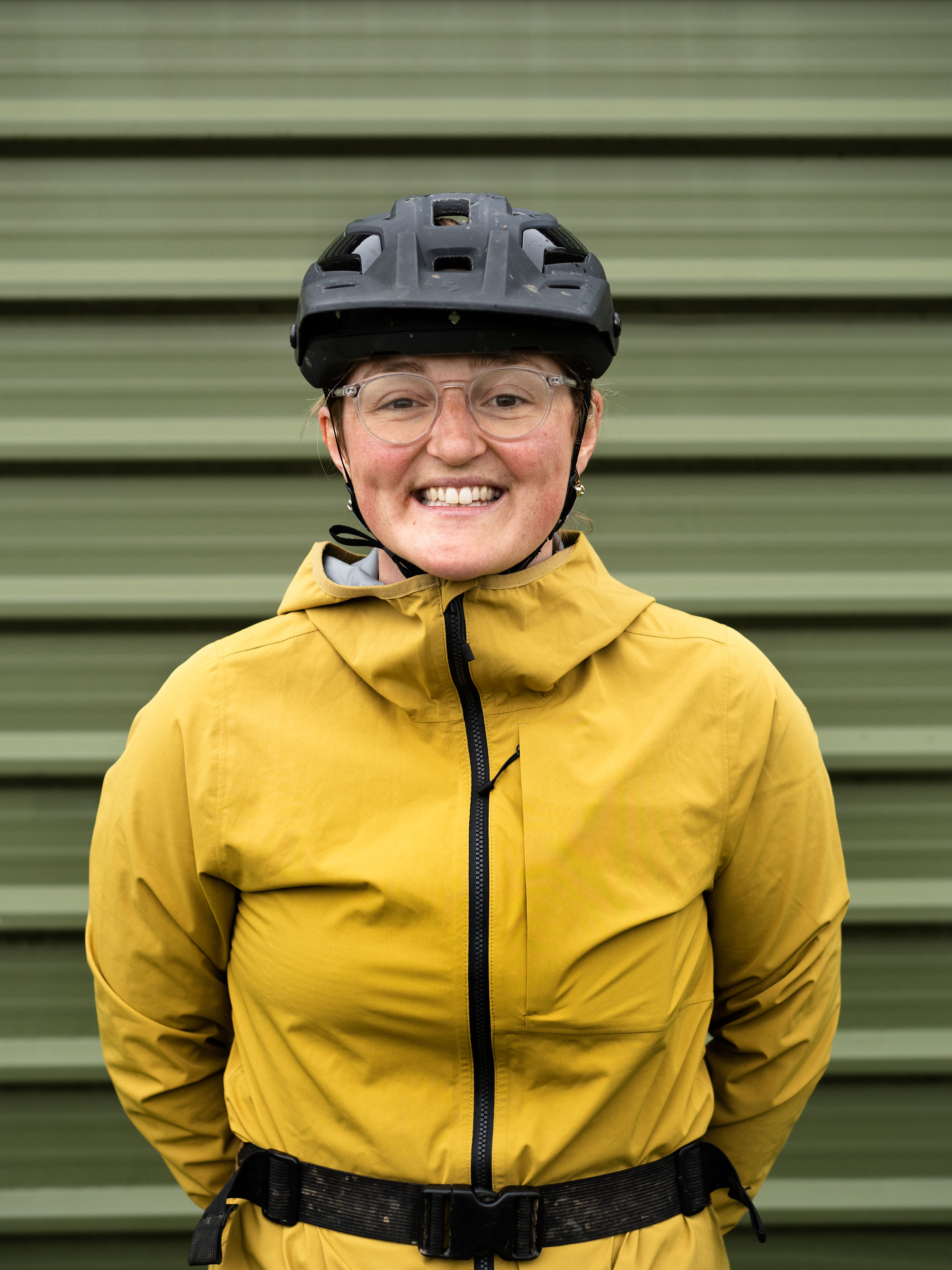
Katherine recently became a qualified level 2 mountain bike guide, having started out on the road side of things in 2017. Before taking the Level 2, the only other formal guiding-related qualification she had was a two-day outdoor first aid, which she’s been renewing every 3 years – ‘Handy to have regardless of whether you’re guiding or not IMO’:
I’ve been a road cycle guide since I first got into the bike industry in 2017, though I had more on-the-job training rather than any qualifications as such. I then did some ride leading for local clubs in Bristol and gravel guiding for komoot at events before deciding to train formally for my Level 2 MTB qualification to make things official as I had started to get more into mountain biking with some cool events on the horizon (Sisters of Send – required a qualification for insurance purposes too I think).
Katherine says that 99% of the guiding work she does is actually gravel/road so perhaps the more remote stuff is less applicable to her and has no desire to coach, so she’ll probably stick with the Level 2 qualification rather than pushing on to the next level.
I wondered which skill she found least intuitive, or needed most effort?
Well apparently I originally failed my assessment based on my own riding skill only (it was a shocker of a day, I was very nervous and I hate being watched) – all the actual guiding stuff comes more naturally to me I think. I was able to pass a few months later having demonstrated a series of rides at a more advanced level.
There was also a bit about trackstanding and bunnyhopping which I find hard ‘cos I don’t usually practice car park skills, and never use them in guiding anyway…
Was there much that you could cram/study up on, or does it really need actual experience over time?
I have been lucky to get experience over time – e.g. learning to navigate with paper maps doing Duke of Edinburgh’s award – and having already done a fair bit of guiding, so I didn’t feel there was much to study. The mechanics was possibly one of my weaker points, but all situations that I had dealt with on the trail before so not too hard.
How much support is there for the learning process, or is it all self led?
On my course there was very little teaching, it was more a recap of what we were expected to already know – so in that sense very self-led I think.
Which part of the process did you enjoy most?
Good question… I’m not sure I did enjoy the training/assessment to be honest. I enjoy using the qualification now though at rad women-led events!
It’s been suggested in the past that the guiding qualifications process is harder for women (especially if there’s a mixed group), due to differences in strength/fitness in men and women, or being assessed against perceived ability to rescue/manage/guide a man. Does that accord with your experience? Do you have any perspectives on that front?
Lol yes bigtime. I do feel that Kell [Kell Collinge] and I were treated differently from the men on our course (for example we were given our feedback together rather than separately, by our teacher/assessor speaking loudly riding behind us as we went up a steep uphill – weird).
I very rarely guide men (and wouldn’t want to tbh – massive generalisation but I’d fear that you’d get some that don’t like being told what to do by a woman) and mainly work women’s events anyway but I think their rationale was that if I was MTB guiding a group of blokes and couldn’t get down the stuff myself it wouldn’t be great (I can understand that) – BUT – I wouldn’t be taking anyone down unsanctioned trails that had also just been mullered by motos, like we were instructed to during our assessment 🙃
I was also on my period during my training/assessment so was a nervous wreck, ha, so that didn’t help!
Any reflections on the assessment or training group dynamic that made the assessment more or less intimidating?
I suppose getting to know the other folks in the day beforehand helped. I would have LOVED to be trained/assessed by a woman, or at least for the company to have at least one woman on their training panel (no such luck).
Share a tip – tool, technique, or otherwise – that you’ve learnt that you think everyone would find useful?
Try and get some guiding practice in before you train – even if that’s just making a plan and taking some pals out on a mountain day or two – so you have more to relate to when you’re going through the process. Also, do the training/assessment somewhere local that you know reasonably well – I didn’t and regretted it.
Claire Sharpe
- Day Job: Head of Marketing and Communications, Beryl (a shared sustainable travel provider, bikes, bikes, bikes!)
- Years mountain biking: 2

Claire is a fairly recent convert to off-road cycling, but has already worked her way up to a Level 3 qualification:
I started 2 years ago after the New Forest Off Road Club got in touch. I had fallen in love with off-road cycling during lockdown and eventually started organising group rides fairly soon after so I could meet more people who loved it too. NFORC wanted to get more women upskilled in the outdoors, and eventually, paid for their time. A rad goal that I was super lucky to benefit from. On that course I met Em [Whitaker – see below] for the first time, now a good friend who was also interested in gaining her Level 3. Around 9 months later, Ed and Al from Pedal MTB got in touch to see if Em and I were still interested in gaining the next certification.
It’s all super recent for me as I have only really been cycling (for anything other than commuting) for 3 years. Before that I played and coached roller derby which gave me a lot of transferable skills to progress relatively quickly with gravel and mountain biking. After riding with various groups and arranging group rides I decided to start a community, All Terre Adventures, with the aim of enabling people to gain the skills and confidence to adventure by bike, independently. I’ve been lucky enough to join rallies, learn skills and head out solo and really want to help other people find that joy too. That’s the main driver for pushing up to Level 3, to take people to remote places so they can experience how great it feels to be super small in huge landscapes, and to have gotten there under your own steam.
Why did you want the qualification? Do you think this is only for those who want a career in guiding?
I think progressing to Level 3 might only be relevant to people who want to pursue guiding in some capacity or have the means to do it as a growth and learning opportunity. There is financial cost to doing it, as well as the time you need to develop skills to be ready for assessment. Level 2 and Fundamentals offer a lot as well so I think unless you plan on using it, the Level 3 is a bit ‘extra.’
Which skill did you find least intuitive/needed most effort?
For me I felt I needed to put the most effort into trailside repairs. I thought that was my weakest area and where I might struggle in my assessment. It’s one thing to do a repair when you need to, but it feels different when someone is watching you and judging your competency. Through riding my bike and adventuring independently, I’d already picked up a lot. It only took a little additional practice to be ready for that on the day. In practice I think I put the most effort into navigating an unknown route by OS Map. You get given the routes the night before, so you have a chance to study them. The next day you set out and navigate using the map. Even with practice, that’s the part that requires attention, and confidence in the decisions you make, while having enough awareness to manage a group at the same time.
Was there much that you could cram/study up on, or does it really need actual experience over time?
I think actual experience over time is important. You can’t fake safely leading people in a remote area you don’t know on a route you only saw the night before, and if you think you can you probably shouldn’t consider guiding… for other people’s safety! Managing a range of people, being able to ensure a mixing pot of personalities and abilities have the best possible ride, on the same ride, is not easy. I’m not finished building experience either, every group ride or guiding opportunity is a chance to learn something new.
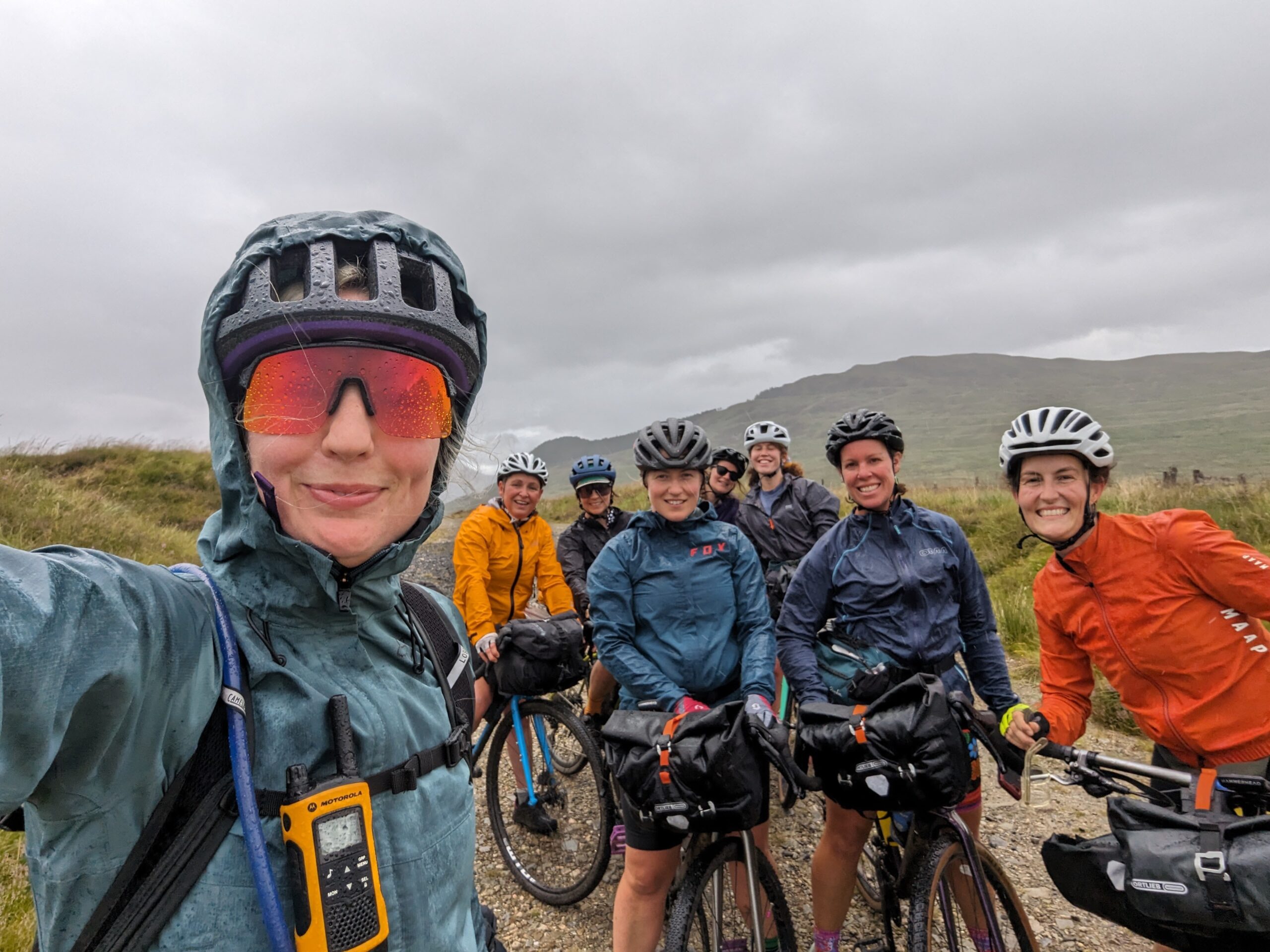
How much support is there for the learning process, or is it all self led?
I imagine this will vary from provider to provider. With Pedal MTB, Ed and Al made it clear at every step of the way that they were there to enable us to pass. If we had questions or reservations, we could contact them. I felt super supported and could lean on friends for their experience as well.
Which part of the process did you enjoy most?
That’s so hard to answer because I really enjoyed it all. Being able to share the experience with Em was really great and meant we could bounce ideas off each other, ask each other questions and be each other’s cheerleader. I really like navigating from a map, you pay more attention and start to build up a picture of your ride before you even get there in a way you never can from a bike computer. I also enjoyed meeting the other people doing Level 3, finding out their motivations and seeing their different guiding styles. I don’t think I can choose just one thing!
It’s been suggested in the past that the guiding qualifications process is harder for women (especially if there’s a mixed group), due to differences in strength/fitness in men and women, or being assessed against perceived ability to rescue/manage/guide a man. Does that accord with your experience? Do you have any perspectives on that front?
I think it probably is harder for women to gain the qualification, but I don’t think it has anything to do with differences of strength or fitness between women and men. For the Level 3 qualification you do need to be able to guide a group where people may be more fit than you, or technically accomplished regardless of their gender, that’s part of it. I think the issue is more with the people who are assessing guides, and if their perceptions and biases mean they assess women differently. Or they have differing ideas of what ‘leadership’ looks like.
Ideally assessors should be held to a standard with regular refreshers to keep them all grading to the same standard. I haven’t experienced this process with another provider, but I have heard from other people about their vastly different experiences. I also think support from British Cycling to train a few women who can deliver these courses wouldn’t be such a bad thing either.
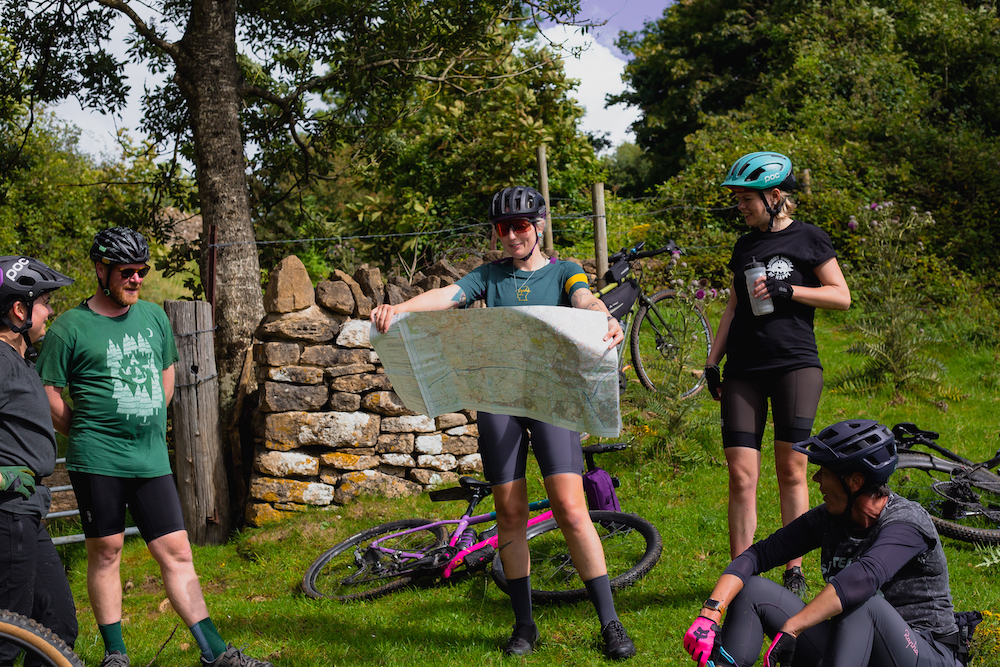
Any reflections on the assessment or training group dynamic that made the assessment more or less intimidating?
The assessment weekend was a pleasure. We did our training and assessment with Pedal MTB who I can’t fault. Ed and Al created a great space for us all to learn in, we could ‘fail’ and learn from that in our training, no questions were stupid questions and they really champion transformative leadership. Al made it very clear in advance what was expected of us, when we arrived we collectively set the tone by sharing what we hoped for and what we needed to excel that weekend. Small details like that foster a group dynamic where everyone is equal and has the chance to enable each other to succeed. I think had the group dynamic been off, then we would have managed it, but ultimately it is on whoever is facilitating the assessment to manage, what better way to demonstrate their own leadership skills?
Share a tip – tool, technique, or otherwise – that you’ve learnt that you think everyone would find useful?
Al and Ed had so many great hacks to make guiding easier. Carrying a chain tensioner in case you did need to singlespeed someone’s bike to make that process way faster, taking spare layers in XL so they will fit anyone…just little things that make sense but would have taken a while for me to get to. Finding out what other guides have in their kit, how they keep it light while still not cutting corners is super interesting.
Having been through the whole process, who do you think should consider doing guiding qualifications?
Anyone who fancies it!
You don’t have to go all the way to Level 3, the Fundamentals course is much less time heavy, more affordable and a great way to start building confidence if you want a boost before leading rides. If you do want to take people out on more technical terrain or to more remote locations then Level 2 covers an awful lot – you can tackle anything that’s lower than hub height and can be anywhere that an ambulance crew can drive to within a 30 min walk of. When you start to plan rides with a Level 2 hat on you can do a lot. Level 3 is the final stepping stone, and if you want to guide people in wild places with confidence and develop your people skills and problem solving skills, then do it. It’s a fun, full-on and affirming.
Emma Whitaker
- Day Job: Marketing Manager @ Stif Mountain Bikes
- Years mountain biking: 14 years (now half my life!)

Emma is now a qualified level 3 guide, having completed her Level 3 on the same course as Claire. It’s been a longer road to qualification than for the riders above:
It’s something I have wanted to do for about 9 years, but I never thought I was good enough to start getting my qualifications. But Nic from New Forest Off Road Club, stepped in in February ’22 with a simple ‘Do you wanna do your Level 2 funded by NFORC in two weeks’ time?’ and I jumped at it. All I needed to get was my British Cycling Level 2 Leadership qualification, a 2-day outdoor first aid course, and a safeguarding course (which comes with the Level 2). Once I had them, I could then start the journey to Level 3.
Why did you want the qualification? Do you think this is only for those who want a career in guiding?
I wanted it so I could do more guiding, and be safer with groups on the hills. Especially through Reyt Good. I think you can do it even if you don’t want a career in guiding but want to have the knowledge and ability to go out there and be safe and confident with a group. But having the qualifications just opens up that door and options for you.
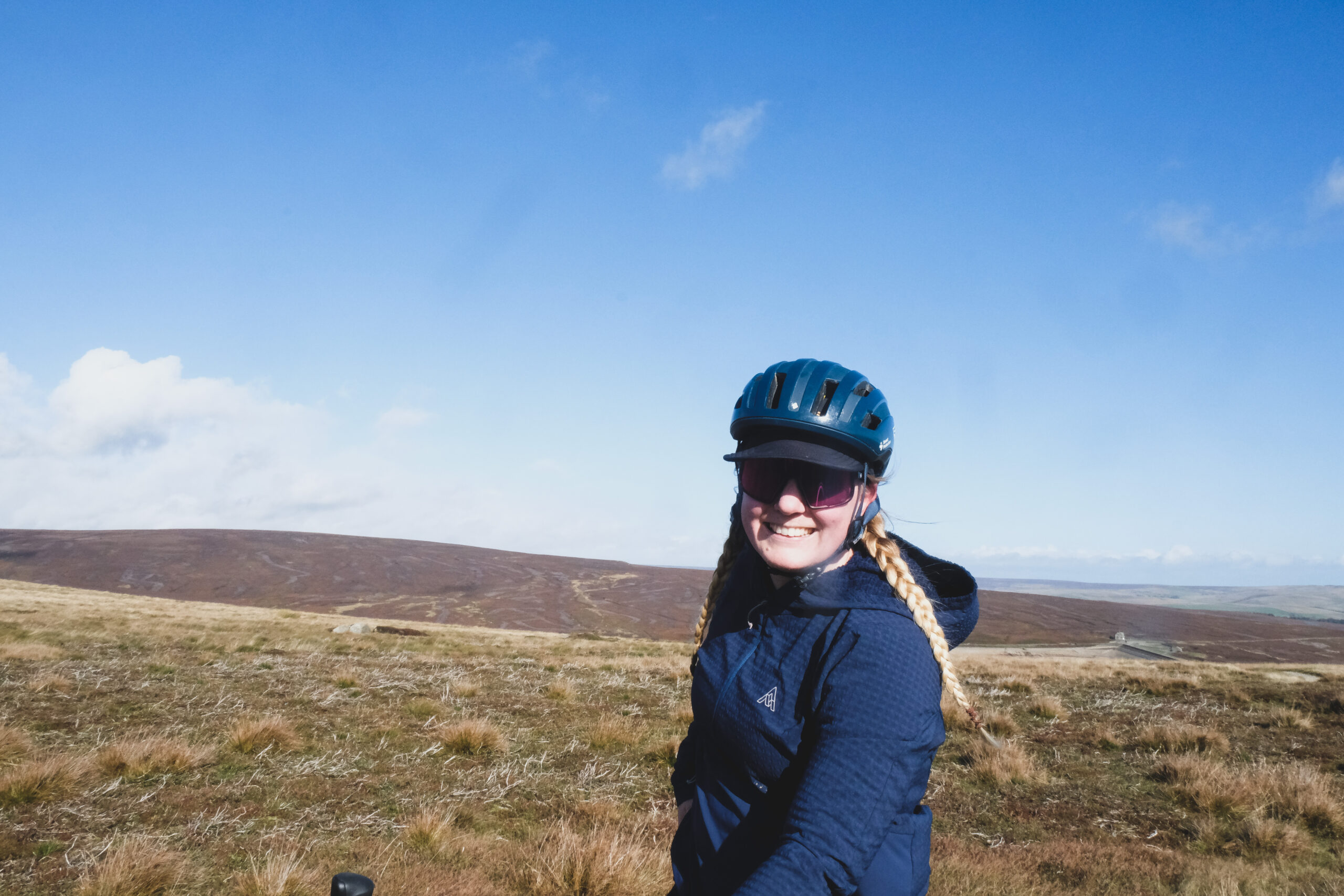
Which skill did you find least intuitive/needed the most effort?
Learning to navigate off a map and not rely on my computer. A really important skill – as I am slightly younger I am used to using technology every day, so learning to use it and not rely on my Garmin was a bit alien at first.
Was there much that you could cram/study up on, or does it really need actual experience over time?
You can become an absolute navigational whiz, but nothing beats actual riding time, riding harder terrain, learning to read the maps on the hills taking groups out, and practicing different ways to lead and ride with a group. The more I did that, the more natural and second nature it came to me. Both levels have a written paper that you do before the actual assessment, but these are like GCSEs. You can go through the textbook and take your time, work it out, and answer them. There’s no need for heavy cramming.
How much support is there for the learning process, or is it all self led?
I think this is completely dependent on which assessor/trainer you go with. Both Ed and Al at PedalMTB made it super aware that they’re there for you if you ever have any questions, or need any help. They’d let you know where you can improve, where you’re excelling and just give all-around great feedback, all the way from level 2 to level 3. If you don’t have that it’s entirely independent outside of the training weekends.
Which part of the process did you enjoy most?
For me, I learned on the hill and bike. I took so much information away from map reading, coaching, and guiding styles while we were out there.

It’s been suggested in the past that the guiding qualifications process is harder for women (especially if there’s a mixed group), due to differences in strength/fitness in men and women, or being assessed against perceived ability to rescue/manage/guide a man. Does that accord with your experience? Do you have any perspectives on that front?
Fitness was something I was worried about at the start of my Level 2. I’m a slow climber and I didn’t want to let down my other skills. It’s not that I’m unfit, I just like to take my time. But luckily for Level 2 I was with people I knew, all women and we all supported one another.
At times in the classroom, we were mixed with another group and there was a classic MTB bloke ruining it for everyone. But Ed and Al sorted this out almost immediately and made it clear this wasn’t a space for that behaviour.
I didn’t experience from Ed and Al that we may have a more challenging time managing/rescuing or guiding a man over a woman. Because even though you’ve got this qualification, it doesn’t mean you’re going to guide people you don’t necessarily want to guide, at least for me anyway. I might get someone every now and then but I want my rides that I end up guiding myself or with other brands to be a welcoming, safe space. And if someone isn’t on board with that, I’ve nothing wrong with having words!
It’s also about keeping the group safe, and if one individual is riding above their comfort zone to show off (willy waving!), and they’re likely to crash, again I’ll have words. As a guide you’re there for the group to be safe and have a good time.
Any reflections on the assessment or training group dynamic that made the assessment more or less intimidating?
Ed and Al at PedalMTB created the perfect environment for learning. They made sure that the group was aware of what they expect, what we expect, and that it’s okay to fail! Especially on the training weekends. During assessment, they would never do any surprise role play, but just calmly check you were on the right path through it all.
During the whole process, I also had Claire with me which was amazing. I’m not sure I’d of had a good time without knowing someone doing it with me. I knew I’d be okay on my own, but the comfort of having a friendly face made all the difference.
Share a tip – tool, technique, or otherwise – that you’ve learnt that you think everyone would find useful?
Okay, so I’ve already raved about this so much. But this emergency spoke! Al created it himself using an old snapped spoke, an old gear cable, and a tensioner. And it works so well! You just thread the gear cable through the hub, stick the spoke and nipple in the original hole, thread the cable through and then pull tight, do up the tensioner, then tighten some more with a spoke key. It’s honestly the coolest bodge I’ve seen!


Having been through the whole process, who do you think should consider doing guiding qualifications?
If you want to do it, go for it – but choose a good trainer like PedalMTB. I think that can make all the difference. To be honest anyone can go ahead and start their journey. You start with a training weekend where you can find out what you may need to improve on. I think some people will gatekeep these qualifications, but once you get through the first training weekend, you’ll know exactly where you stand.
Chris Lansley
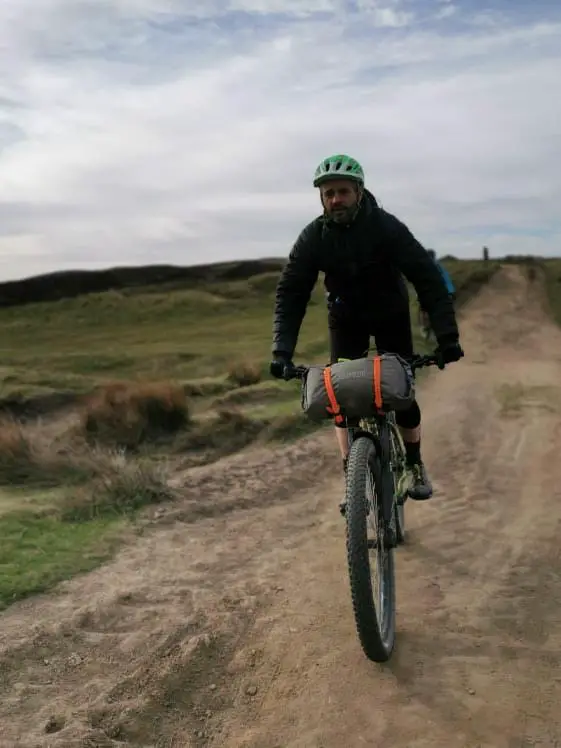
- Day Job: Civil Servant, currently doing portfolio management stuff
- Years mountain biking: I got my first one in 1986, a 20” wheel Puch. Since then, I’ve gone through many personal fads bike-wise (BMX, road bikes, audax, fixies, polo…), but I properly regained the MTB bug around 2014, when having kids meant I didn’t have as much time and couldn’t just bimble around the lanes on my road bike all day.
Chris went straight in at level 2 on the British Cycling pathway:
‘This allows me to work in a variety of locations, rather than being tied to a single site (level 1). As part of the qualification, I also did a 16-hour outdoor first aid course.’
Image Credit: Stefan Amato/Pannier CC
When did you first start on the path of taking qualifications in cycling?
The TL;DR version is I did the training April 2022. The trainer suggested I crack on and get qualified straight away, which I did in June (along with outdoor 1st aid). I did a bit of pro bono work for the MTB Colour Collective in October, then started getting paid work from April this year.
The longer and more complicated version might sound like a bit of an odd starting point, but it was the murder of George Floyd in 2020 that kicked things off. I was brought up in a pretty socialist, socially progressive environment. I’ve been aware from a young age about discrimination, and have always found it pretty hurtful to see. The discussion around discrimination has really moved on since I was a kid though, and the response to George Floyd’s murder really brought that home to me.
I’ve seen pretty blatant discrimination in mountain biking, from being told to f**k off from a Facebook group for pointing out sexist language wasn’t going to do much for a sport that already had a massive gender imbalance, to frequent use of “gay” as a pejorative term, to outright homophobic slurs. In the wider outdoors community, groups such as the Muslim Hikers have prompted the racist underbelly of Little England to complain that Mam Tor should be left for “proper walkers”. But discrimination is more than just abuse – it’s also present in the way our world is set up, how our societies are structured. I learned more about the barriers people from different communities can face when trying to engage with mountain biking. I came to understand that simply saying, “I treat everyone equally,” or, “I don’t see race,” a) wouldn’t remove these barriers, and b) meant I’d effectively be keeping those barriers up by maintaining the status quo.

Why did you want the qualification? Do you think this is only for those who want a career in guiding?
So, leading on from this, I thought that leading could be a way to make a positive change. As a cis/het/white/male, I’m never going to be moving the dial myself when it comes to increased diversity, but I can try to give other folk the opportunity. Hopefully I can get some people hooked, and they can go out there and be the role models we need. In addition to this, I like riding my bike, I like sharing the outdoors with people, and I like to help people out. Leading rides is a pretty good combination of these things.
As for a career? I guess if you really want to do it as a career, then you’ll need some qualifications! But for me, I’m privileged enough that I have a steady job, and a roof over my head; for me, leading is a little side project. I’ve done one season of paid work so far, mainly freelancing for a local outdoor pursuits company. This has meant a nice little bit of extra money, but nowhere near enough to live on. The dream is to get enough paid MTB work that I could drop my hours in the day job a bit, but that’s for the future.
Despite all that, it doesn’t have to be about it being a job. Community ride leaders can benefit, the skills you learn in terms of (safely) managing a group of cyclists are great, you’ll learn about being more self-sufficient in the great outdoors, you may put your first aid training into practice and maybe even save somebody’s life. Look at groups like the Colour Collective and New Forest Off-Road Club – not a commercial venture, but they’re doing great things to get a more diverse set of folk riding off-road, and are putting their ride leaders through the MTB leaders training.
Which skill did you find least intuitive/needed most effort?
I’d say there are three main skills in play most of the time: riding, navigating, and managing a group of people. In addition, you need to be organised in terms of admin (record keeping, risk assessments etc.), and be prepared for things going wrong (first aid, a limited range of mechanical tasks).
Of these, I’ve ridden bikes a lot, am happy reading maps and seem to have a pretty good sense of orientation, and I’ve worked in a bike shop. My time in the Civil Service means I’m familiar with admin and risk management. I did wonder how the people management side of things would go, but I’ve dealt with lots of folk over the years in a variety of situations, and it seems like that’s stood me in good stead. I did learn some key techniques on managing the group while riding in both the training and assessment phases, but I took these onboard very quickly.
First aid training was good, and it went well, but I’m yet to encounter a proper crisis moment when that training may need to be put into practice. The ideal is that I never need to find out how I’ll react, but if the poop does hit the fan I know I’ve got the knowledge, the equipment, and the preparation behind me.
Was there much that you could cram/study up on, or does it really need actual experience over time?
I think there’s the practical side to leading, and there’s the rules. For me, I already knew and/or had plenty of experience in a lot of the practical side, so didn’t need to read up on or practise that. My assessment had a requirement to show a number of rides in differing terrain over a recent period. The rules struck me as pretty straightforward (acceptable levels of difficulty for terrain, how many people you can lead at one time etc.), but I did take the time to make sure I read through it all before attending the training course.
I think there’s definitely a need for some experience over time, but that’s going to differ from person to person. In addition, a lot of the (non-bike) skills may transfer across from other walks of life.

How much support is there for the learning process, or is it all self led?
Apart from the formal parts (the training and the assessment), I didn’t feel there was much need for me to do anything extra, so being self-led didn’t really come into it for me.
Which part of the process did you enjoy most?
Being validated as a good rider and leader – I’ve always suffered with self-doubt/impostor syndrome, so to have people tell me I was ready to go straight to assessment, and then that I was a good leader and should start focussing on level 3 straightaway was really nice. One bit of feedback that I was really happy with was my assessor said I lacked any obvious ego and was happy to work in a way that put the riders I was leading in the spotlight.
Any reflections on the assessment or training group dynamic that made the assessment more or less intimidating?
I did my training at an outdoor pursuits centre that offers a range of activities. Of our group of five trainees, I was the only one who wasn’t already a qualified outdoor instructor – everyone else was adding MTB as a string to their bow. In retrospect, I think this meant there was more focus on the practical side of riding, and maybe less on the rules side. Maybe I’d have benefitted a bit more if the focus had been the other way round?
The assessment itself started off with lots of probing questions from our assessor, which maybe led to a bit of a feel that we weren’t doing things quite right? But as the day went on, it became clear this was a way of checking our understanding and also providing extra opportunities to learn.
Share a tip – tool, technique, or otherwise – that you’ve learnt that you think everyone would find useful?
- You have to carry a lot of kit as a ride leader, a frame bag can take a load off your back.
- A short length of hosepipe can be useful when bodging a single speed set up.
- Always have a bag of jelly beans or similar to share around.
Having been through the whole process, who do you think should consider doing guiding qualifications?
People who want to share off-road cycling with others.
People who want to develop others; one experienced leader I’ve worked with told me it’s not just about guiding people on rides – we should be developing them, making sure they leave us with some new-found skills or knowledge or confidence.
Definitely more people from groups that are under-represented in MTB: women, LGBT+ folk, people from non-white backgrounds. I’ve led rides for the Colour Collective and Peak Queer Adventures – I’m happy to help out if there are any other groups out there who might be in a similar boat. (You can get in touch via Instagram)
Having read these stories, I’m struck by the fact that you don’t need years of riding experience to get qualified. It seems like finding a supportive environment – and perhaps having someone give you a leg up along the way by inviting you to do it – is more of a key to success. If you’re tempted to give a qualification a go, it seems like a good idea to finding a training/assessment set up that’s a good match for you and your approach to riding. Head to the comments to share your own experiences and recommendations!|
- In the UK, guiding qualifications are through British Cycling. See their website for more details, providers and dates.
Want further inspiration to get qualified? Try this:
Resort guides
Where will you ride next?→





